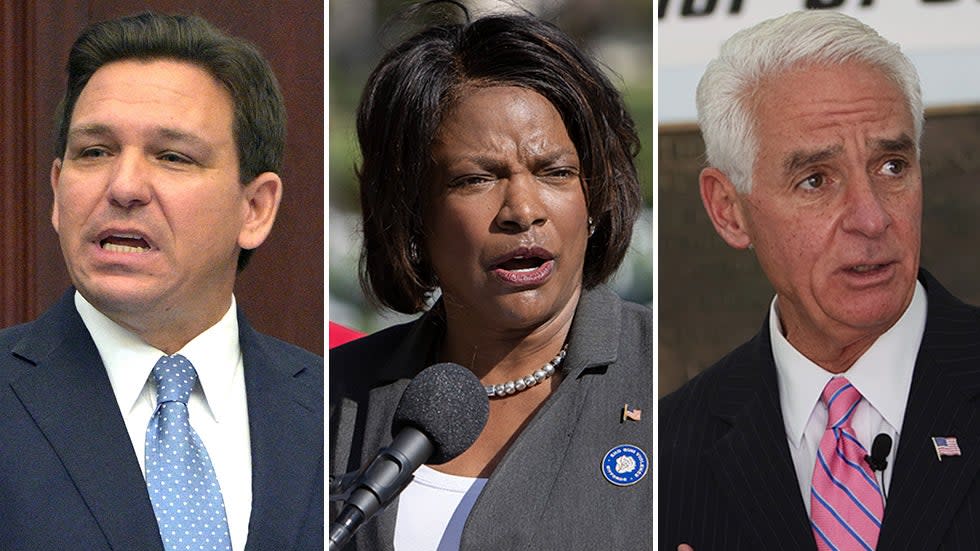Biden's moves on Venezuela become flashpoint in Florida

- Oops!Something went wrong.Please try again later.
- Oops!Something went wrong.Please try again later.
- Oops!Something went wrong.Please try again later.
The Biden administration's recent overtures in Venezuela are putting Democrats on defense in Florida at a time when the party is already reeling from recent losses among Latino voters in the state.
Republicans seized on the Biden administration's decision last week to deploy officials to Venezuela in the wake of the U.S. import ban on Russian oil. The issue is likely to hit home in Florida, where many voters have ties to Venezuela and other Latin American countries.
"Foreign policy is not considered foreign policy in a state like Florida, foreign policy is very personal," said Joanna Rodriguez, deputy communications director at the Republican Governors Association.
"To see the Biden administration dismiss that experience completely so that they can try and fix the mess that they created at home is outrageous," she added.
Last week's visit from senior administration officials to Venezuela was a planned meeting, but many note that the stakes changed since the U.S. sanctions on Russia were enacted. After the meeting, two American prisoners detained in Venezuela were released. A Biden administration official said last week that "at no point was there an offer of oil in exchange for the detention of Americans."
A number of U.S. sanctions are already in place against Venezuela, with some of them tied to President Nicolás Maduro's alleged human rights violations.
But last week's visit resulted in backlash from both Republicans and Democrats. The talks have since been put on a hiatus.
Florida Gov. Ron DeSantis (R) slammed the talks in a statement last week, pointing to what he said was a legitimization of Maduro and a sign the Biden administration is not serious about becoming energy independent.
"Now we're in a situation where people are really hurting and rather than acknowledge that their policies have been ineffective, they're going to Maduro and they're going to the Ayatollahs in Iran," DeSantis said.
Earlier this month, 25 Republican governors, including DeSantis, called on Biden to remove bans on new oil and gas development on federal lands and to build the Keystone XL pipeline in an effort to make the U.S. more energy independent.
The thorniness of the issue was made evident by the reactions of several Florida Democrats, who expressed skepticism about the Biden administration's overtures toward Venezuela.
Rep. Val Demings (D-Fla.), who is challenging Sen. Marco Rubio (R-Fla.) for his seat this year, said she was "deeply skeptical of the new talks in Venezuela" and insisted that any negotiations with Maduro's government should be focused on securing the release of imprisoned Americans and "empowering the Venezuelan people in their struggle for freedom and democracy."
Likewise, Rep. Charlie Crist (D-Fla.), the leading Democratic candidate for governor, said he was worried that any deal with the Venezuelan government would only serve to benefit Maduro and hinder pro-democracy movements in the country.
"I've asked the Administration for an update on their activity in Venezuela, and I look forward to getting answers," Crist tweeted. "I'm deeply concerned the wrong change to our policy would simply enrich Maduro's brutal dictatorship and set back the fight for democracy."
While foreign policy rarely tops the list of most important issues for voters, that's not necessarily the case in Florida, a state with deep ties to Latin America.
A poll from Florida International University late last year found that 57 percent of Florida Latinos said the political situation in their country of origin was either important or very important to their voting decisions. That number included 56 percent of respondents of Venezuelan origin.
Florida has the largest Venezuelan population in the U.S., according to a recent survey from the Pew Research Center that used data from the 2020 census.
Also complicating the issue for Democrats is Florida's rightward shift in recent years. Former President Trump made significant inroads with Florida Latinos in 2020 after aggressively casting Democrats as socialists sympathetic to autocratic leaders like Maduro.
Those gains were particularly pronounced in heavily Democratic areas like Miami-Dade County - where more than half of all residents were born outside of the U.S. mainland and where the Venezuelan population is growing.
At the same time, Republicans officially overtook Democrats in voter registration for the first time in state history late last year, marking a major reversal from little more than a decade ago when there were some 568,000 more registered Democrats than Republicans.
The stakes in 2022 are also particularly high. In Florida alone, both DeSantis and Rubio are up for reelection and both parties are defending competitive House districts. Democrats also have little room for error. The GOP needs to gain just five seats in the House and only one in the Senate to recapture control of Congress.
One Democratic consultant with ties to Florida described the overtures to Venezuela as something of a double-edged sword.
On one hand, the consultant said, Trump's "maximum pressure" campaign to oust Maduro didn't pan out. There's also the need to mitigate rising oil prices, and lifting sanctions on Venezuelan oil - at least partially - could help with that.
"The problem, though, is that this is an emotionally charged issue for a lot of people in Florida," the consultant said. "And I think you have to ask, when the U.S. is engaging with Maduro, does that legitimize him? Does that give him more leverage? And if it does, I think there are going to be some real political consequences here."
"Foreign policy is big," the consultant added. "How Democrats talk about Venezuela, Cuba, Nicaragua - it's going to matter."

